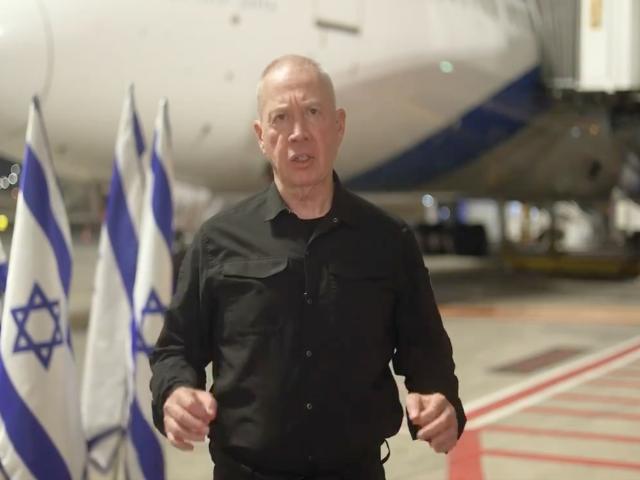Israeli Defense Minister Yoav Gallant embarked on a critical mission to Washington on Sunday, aiming to strategize with U.S. officials about the escalating conflict in Gaza and the intensifying tensions on Israel's northern border with Lebanon. The situation is dire, with Hezbollah, the Iranian-backed militant group, persistently exchanging fire with Israel, raising the specter of a broader, more devastating conflict.
Since the Gaza war erupted over eight months ago, Hezbollah has been relentless, launching attacks that have significantly heightened the region's volatility. The group's uncompromising stance is clear: they will not cease their aggression until a cease-fire is established in Gaza. "We are prepared for any action that may be required in Gaza, Lebanon, and in more areas," Gallant asserted confidently before departing to meet with U.S. Defense Secretary Lloyd Austin and Secretary of State Antony Blinken.
Defense Minister Gallant is in Washington this week. One of his goals for the visit is to convince the Biden administration to get the arms shipments back on track.
— Lahav Harkov 🎗️ (@LahavHarkov) June 23, 2024
The stakes have never been higher. In a brazen show of force earlier this month, Hezbollah unleashed its largest assault yet on Israeli towns and military sites, deploying rockets and drones in response to an Israeli strike that eliminated a senior Hezbollah commander. This violent escalation prompted a visit from U.S. envoy Amos Hochstein, who sought to mediate and reduce tensions amid the increasing cross-border fire and hostile rhetoric.
Israeli officials are acutely aware of the intricate link between their operations in Gaza and the potential need for action in Lebanon. Gallant underscored this connection, emphasizing, "The transition to Phase C in Gaza is of great importance. I will discuss this transition with U.S. officials." This next phase is crucial; reducing operations in Gaza could allow Israel to redirect its military resources to confront Hezbollah, should a ground offensive or intensified aerial attacks become necessary.
Israeli Minister of Defense, Yoav Gallant has Departed with a Delegation of Military Officials for a Week of Meetings in Washington with U.S. Secretary of Defense, Lloyd Austin and other Senior U.S. Officials. Before leaving from Tel Aviv, Gallant stated, “The Relationship with… pic.twitter.com/wupDmCBETq
— OSINTdefender (@sentdefender) June 23, 2024
Gallant, a prominent member of Prime Minister Benjamin Netanyahu's Likud party, is pushing for a clear and decisive postwar plan for Gaza that does not leave Israel in a controlling position—an approach aligned with the White House's views. Netanyahu, however, is navigating a precarious balance between the defense establishment's demands and the far-right coalition partners' opposition to any strategy that could pave the way for a Palestinian state.
Adding to the complexity, Yuli Edelstein, head of Israel's parliamentary Foreign Affairs and Defense Committee, highlighted the intricate dilemma of engaging Hezbollah now or delaying the confrontation. Edelstein also criticized Netanyahu's recent video accusing the Biden Administration of withholding critical weapons from Israel, a move that strained relations with the White House.
ISRAELI DEFENSE MINISTER YOAV GALLANT HEADS TO WASHINGTON FOR CRUCIAL TALKS
— Open Source Intel (@Osint613) June 23, 2024
Israeli Minister of Defense Yoav Gallant has departed with a delegation of military officials for a week of meetings in Washington with U.S. Secretary of Defense Lloyd Austin and other senior U.S.… pic.twitter.com/fHbFssfllu
Tensions between Washington and Jerusalem are palpable. The White House is on edge, anticipating Netanyahu's upcoming address to a joint session of Congress, where he might openly criticize President Joe Biden for what he perceives as insufficient support for Israel's retaliatory measures against Hamas in Gaza. This address, set for next month, could transform into a diplomatically charged and politically contentious event, especially with President Biden's re-election campaign underway.
Concerns among West Wing aides have intensified, particularly following Netanyahu's public statements, including a provocative video in English, accusing the administration of withholding more military aid than publicly disclosed. "Netanyahu's video this week was not helpful at all," lamented a senior official, speaking on condition of anonymity. "And he could make it far worse up there in front of Congress."
The frictions between Biden and Netanyahu have deepened since the onset of the Israel-Hamas war. Biden's aides increasingly believe that Netanyahu is prolonging the conflict to maintain his political power, with a preference for Donald Trump's return to the White House. This ongoing war presents a thorny political dilemma for Biden, who faces criticism from Republicans for not fully supporting Israel and from his own party for not sufficiently protecting Palestinian civilians.
Democrats wrestle with whether to attend Netanyahu's address to Congress as many plan to boycott https://t.co/ly8OI0RH5T
— PHL17 (@phl17) June 23, 2024
Netanyahu's recent accusations have brought U.S.-Israel relations to a new low, catching the West Wing off guard and leaving Biden's team deeply frustrated. The Biden administration even postponed a high-level U.S.-Israel meeting on Iran following Netanyahu's contentious video. "We genuinely do not know what he's talking about," White House press secretary Karine Jean-Pierre said, emphasizing that only one shipment was paused, with no other changes to weapons transfers.
As of this week, the White House had not yet extended an invitation for Netanyahu to meet with Biden during his Washington visit scheduled for July 24. However, officials suggest such an invitation will likely be extended to avoid a significant diplomatic slight. The White House did not comment on the invitation status, underscoring the delicate and tense state of U.S.-Israel relations as both nations navigate this complex and volatile period.


